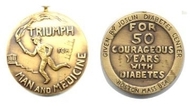I’m never sure when it comes to really anything how much to attribute to my diabetes and how much to attribute to… me.
For example: did I tire out running up the hill the other day because I had been low the day before, or did I tire out running up the hill because I was… running… up… a hill?
Do I need to pay attention to my hydration because of how that may affect my diabetes or because of how that may affect my strength and endurance?
Do I have dry skin because it’s summer or because I have diabetes and it’s summer?
Do I wear glasses because I have diabetes or because I’m my father’s daughter?
Am I grumpybecause I’m grumpy or because I’ve been high and I’m grumpy?
See what I mean?
The only kind of answer I’ve reached for myself to this question is to say there is no answer. I can’t
separate my physical self from my physical self with/without diabetes. I’m me and that includes my diabetes. So what, in the end, does it matter whether I have diabetes eyesight or Dad’s eyesight? They are my eyes.
The main difference I see between the two definitions (me versus me with diabetes, or my diabetes) is that it’s a pretty big wall. A pretty big wall between myself and people without diabetes.
I don’t get a whole lot of support if that wall is too high.
No one else in my family can understand what it feels like to try to chug up a hill with a blood glucose of 281. No one else in my family can understand just what it takes out of me to be low for three nights at 2am with an average reading of 46. They just can’t. I think they would if they could, because it’s a big part of my life and they’d like to understand, but they can’t.
So yes, I get an immeasurable value from my friends with diabetes because they do understand what those things feel like and that makes me feel less alone. They know what it’s like to have swinging blood sugars and want to put the whole thing down and get a break from carrying the responsibility of keeping our blood glucose levels as normal as possible all of the time. They understand just how frightening it is to be so low you don’t know where you are, and come out of that low with wet clothes and freeze until you can change into dry clothes.
It’s just how we live.
Yet, I have a load of clients and friends who need to be concerned about their hydration levels in the warm summer months and cold winter months as they work out. I have I think more friends than I realize who wear contacts or glasses, or who have had laser eye surgery. Every single person I’ve ever met has had to take medication for an illness or antibiotics for an infection or gotten shaky if they haven’t eaten. Each person on the planet has felt grumpy for one reason or another.
We’re all the same in that we are all different in different ways. Diabetes is just one of my ways.
So yes, I feel everything I feel and need to worry about everything I worry about because of my diabetes. And I feel everything I feel and need to worry about everything I worry about because I’m me and that’s how I feel and what I worry about.
What do you think about that? How do you make it work for you and your life?


